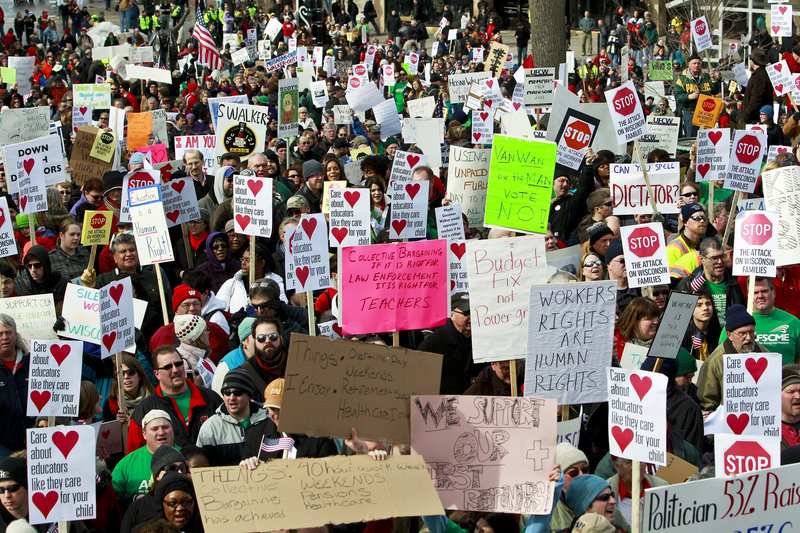MADISON, Wis. — Wisconsin is poised to strip collective bargaining rights from most of the state’s 175,000 public employees in the boldest step by a new Republican governor and Legislature to solve budget problems by confronting organized labor.
The state Senate and Assembly are expected to vote as soon as Thursday on Gov. Scott Walker’s plan to end collective bargaining for all state, county and local workers except for police, firefighters and the state patrol.
More than 10,000 public employees workers staged demonstrations at the state Capitol Tuesday to protest the measure, banging on drums and screaming “Save our state!” and “Kill the bill!” A parade of witnesses also testified before lawmakers about the impact on middle-class families.
But legislative leaders said Walker now has enough support in both chambers to approve the measure, which he said is necessary to address a projected $3.6 billion budget deficit.
“We’re broke and we don’t want to lay off almost 20,000 people,” said Senate President Mike Ellis, a Republican.
Union representatives were attempting to sway key moderates for a compromise but Democrats said the bill would be tough to stop. “The Legislature has pushed these employees off the cliff but the Republicans have decided to jump with them,” said Sen. Bob Jauch, one of 14 Democrats in the 33 member chamber.
New Republican governors and legislatures in other states have proposed cutting back on public employee costs to reduce budget shortfalls, but Wisconsin’s move appears to be the earliest and most extensive.
The state is a stronghold of organized labor. But the election of Walker, an outspoken conservative, last November and the GOP’s seizing of control of both legislative chambers set the stage for a dramatic reversal.
Walker’s plan would make workers pay half the costs of their pensions and at least 12.6 percent of their health care premiums. State employees’ costs would go up by an average of 8 percent. The changes would save the state $30 million by June 30 and $300 million over the next two years.
Unions could still represent workers, but could not seek pay increases above the Consumer Price Index unless approved by a public referendum. Unions also could not force employees to pay dues and would have to hold annual votes to stay organized. Local police, firefighters and state troopers would retain their collective bargaining rights.
In exchange for bearing more costs and losing leverage, public employees were promised no furloughs or layoffs. Walker has threatened to order layoffs of up to 6,000 state workers if the measure did not pass.
Copy the Story Link
Send questions/comments to the editors.



Success. Please wait for the page to reload. If the page does not reload within 5 seconds, please refresh the page.
Enter your email and password to access comments.
Hi, to comment on stories you must . This profile is in addition to your subscription and website login.
Already have a commenting profile? .
Invalid username/password.
Please check your email to confirm and complete your registration.
Only subscribers are eligible to post comments. Please subscribe or login first for digital access. Here’s why.
Use the form below to reset your password. When you've submitted your account email, we will send an email with a reset code.